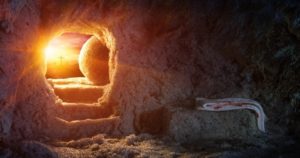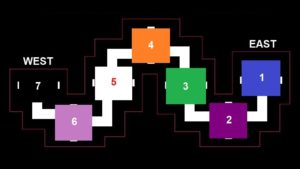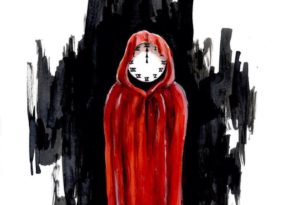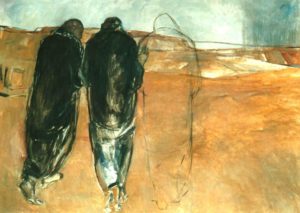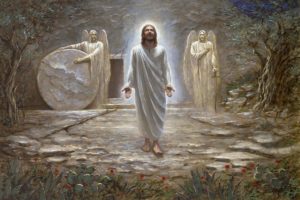The Stranger on the Road, Part 1
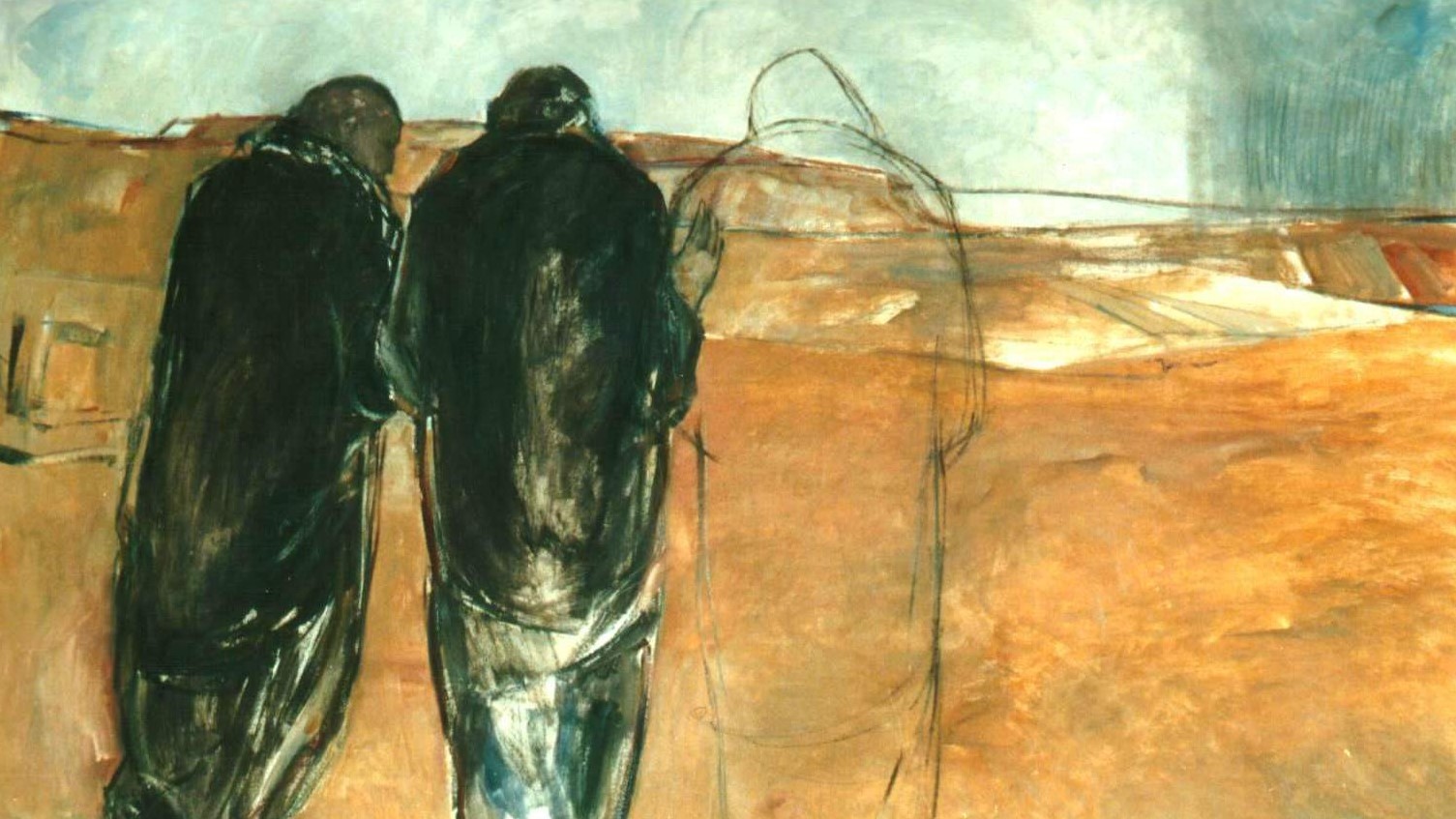
by Pastor Gene
Text: Luke 24:1-39a
The Resurrection
But on the first day of the week, at early dawn, they went to the tomb, taking the spices they had prepared. 2 And they found the stone rolled away from the tomb, 3 but when they went in they did not find the body of the Lord Jesus. 4 While they were perplexed about this, behold, two men stood by them in dazzling apparel. 5 And as they were frightened and bowed their faces to the ground, the men said to them, “Why do you seek the living among the dead? 6 He is not here, but has risen. Remember how he told you, while he was still in Galilee, 7 that the Son of Man must be delivered into the hands of sinful men and be crucified and on the third day rise.” 8 And they remembered his words, 9 and returning from the tomb they told all these things to the eleven and to all the rest. 10 Now it was Mary Magdalene and Joanna and Mary the mother of James and the other women with them who told these things to the apostles, 11 but these words seemed to them an idle tale, and they did not believe them. 12 But Peter rose and ran to the tomb; stooping and looking in, he saw the linen cloths by themselves; and he went home marveling at what had happened.
On the Road to Emmaus
13 That very day two of them were going to a village named Emmaus, about seven miles from Jerusalem, 14 and they were talking with each other about all these things that had happened. 15 While they were talking and discussing together, Jesus himself drew near and went with them. 16 But their eyes were kept from recognizing him. 17 And he said to them, “What is this conversation that you are holding with each other as you walk?” And they stood still, looking sad. 18 Then one of them, named Cleopas, answered him, “Are you the only visitor to Jerusalem who does not know the things that have happened there in these days?” 19 And he said to them, “What things?” And they said to him, “Concerning Jesus of Nazareth, a man who was a prophet mighty in deed and word before God and all the people, 20 and how our chief priests and rulers delivered him up to be condemned to death, and crucified him. 21 But we had hoped that he was the one to redeem Israel. Yes, and besides all this, it is now the third day since these things happened. 22 Moreover, some women of our company amazed us. They were at the tomb early in the morning, 23 and when they did not find his body, they came back saying that they had even seen a vision of angels, who said that he was alive. 24 Some of those who were with us went to the tomb and found it just as the women had said, but him they did not see.” 25 And he said to them, “O foolish ones, and slow of heart to believe all that the prophets have spoken! 26 Was it not necessary that the Christ should suffer these things and enter into his glory?” 27 And beginning with Moses and all the Prophets, he interpreted to them in all the Scriptures the things concerning himself.
28 So they drew near to the village to which they were going. He acted as if he were going farther, 29 but they urged him strongly, saying, “Stay with us, for it is toward evening and the day is now far spent.” So he went in to stay with them. 30 When he was at table with them, he took the bread and blessed and broke it and gave it to them. 31 And their eyes were opened, and they recognized him. And he vanished from their sight. 32 They said to each other, “Did not our hearts burn within us while he talked to us on the road, while he opened to us the Scriptures?” 33 And they rose that same hour and returned to Jerusalem. And they found the eleven and those who were with them gathered together, 34 saying, “The Lord has risen indeed, and has appeared to Simon!” 35 Then they told what had happened on the road, and how he was known to them in the breaking of the bread.
Jesus Appears to His Disciples
36 As they were talking about these things, Jesus himself stood among them, and said to them, “Peace to you!” 37 But they were startled and frightened and thought they saw a spirit. 38 And he said to them, “Why are you troubled, and why do doubts arise in your hearts? 39 See my hands and my feet, that it is I myself.
Good morning, Church.
Resurrection Sunday is the glorious end to the worst week the world has ever experienced: the week when the Son of God was put to death at the hands of sinful men.
It’s obviously a day rife with meaning: meaning for unbelievers, and meaning for believers too.
Unbelievers – those who have not yet believed in Jesus – have missed the boat by not yet coming to Christ that they might live.
But believers – those who have come to life by faith in Jesus – have often missed the boat by not coming to Christ that they might die.
It’s a deep and ponderous thing, this Resurrection Sunday!
While it calls unbelievers out of death into life, it calls those who have found life to die in order that they might truly live – in what Paul calls, “resurrection” life or “the newness of life in Christ Jesus.”
So, let me try to speak to you this morning no matter which side of faith you find yourself on.
And, as always, I’m speaking to myself as well!
Now, since it is Resurrection Sunday, or what has traditionally been called Easter, I am aware that we may have a few seekers joining us for this morning’s message.
So, I will have a word for you, if you are curious and trying to figure things out – and I’ll have a word for those who are already following the Lord Jesus as well.
Prayer.
A Word for Seekers
1) OK, First, a word to those who are seeking – or even not seeking.
Perhaps you’re marginally interested in Christianity as a religious world view, or as a sociological factor in the flow of history, or maybe you’ve been dared or cajoled into listening in this morning.
I want you to know something about yourself that you may not know. I don’t say that to be demeaning or unkind, really I don’t. The truth is, I’m talking about something that you don’t ever see until you see it.
There are lots of reasons for this. The Bible tells us that the devil – God’s great enemy, and ours – blinds our eyes so that we won’t see it. But truth be told, we don’t even need Him to deceive us, we’re all surprisingly proficient in the art of self-deception.
But here’s the thing: once you see it, you can’t unsee it! And once you see it, you have to make a decision about what to do about it.
2) In my young adult years particularly, I was enamored by the short stories of Edgar Allen Poe. Poe was a troubled man who wrote troubled stories, many of which bordered on the macabre, and even terrifying. But they were all fantastically imaginative and extremely well-written.
The one that struck me most – and still does – is a short story I’ve referred to a number of times throughout the years because I think it contains a number of important insights on the human condition: The Masque of the Red Death. It’s about fear, and pride, and hubris, and self-sufficiency, and the tragic consequences of thinking we’ve got it all figured out.
The ‘masque’ in the title – that’s MASQUE – was a kind of party that was popular with the nobility in the 1500 and 1600s. It consisted primarily of amateur entertainment some drama, dancing, and other novelty. It’s the word we get masquerade from – as in a masquerade ball.
Anyway, it’s a very short, but stunning piece of literature – and curiously relevant to our situation today, because the “Red Death” in the title refers to a plague or pestilence.
3) In the story, the “Red Death” is a plague which is vanquishing the whole land. It begins like this:
“The red death had long devastated the country. No pestilence had ever been so fatal, or so hideous … Blood was its Avatar and its seal … The scarlet stains upon the body and especially upon the face of the victim, were the pest ban which shut him out from the aid and from the sympathy of his fellow-men. And the whole seizure, progress, and termination of the disease, were incidents of half an hour.
But Prince Prospero was happy and dauntless and sagacious. When his dominions were half depopulated, he summoned to his presence a thousand … light-hearted friends from among the knights and dames of his court, and with these retired to the deep seclusion of one of his crenellated abbeys …
The abbey was amply provisioned. With such precautions the courtiers might bid defiance to contagion. The external world could take care of itself. In the meantime, it was folly to grieve or to think. The prince had provided all the appliances of pleasure. There were buffoons, there were improvisatori, there were ballet-dancers, there were musicians, there was Beauty, there was wine. All these and security were within. Without was the “Red Death.”
So, while the plague ran through his kingdom – halving the population with its spread – Prince Prospero decided to throw a party – a ‘masque’ – for 1000 of his closest friends. The pestilence was so horrible, so painful to look upon, that any one who caught it could expect no sympathy even from his or her closest loved ones. From the contraction of the disease to death took a mere 30 minutes.
But the arrogance and pride of the Prince is evident in Poe’s writing:
“Prince Prospero was happy and dauntless and sagacious … When his dominions were half depopulated, he summoned to his presence a thousand … light-hearted friends from among the knights and dames of his court, and with these retired to the deep seclusion of one of his crenellated abbeys [that is, abbeys furnished with battlements] … The abbey was amply provisioned. With such precautions the courtiers might bid defiance to contagion. The external world could take care of itself … All these and security were within. Without was the “Red Death.”
Poe writes that “this was an extensive and magnificent structure, the creation of the prince’s own eccentric yet august taste.”
He went on to describe the abbey – it was a weirdly-architectured building of seven rooms arranged so that you couldn’t see one room from the other. And each room had its own unique color. Moving east to west they were (1) blue – everything in the room was vivid blue – vivid blue windows, the ornaments, the tapestries, the panes, the lighting, everything blue. The second was purple, the third was green, the fourth was orange, the fifth was white, the sixth was violet and the final room … O, the final room! The final room was completely black, with deep red accents, with a large ebony clock within.
These rooms obviously are meant to represent life, death and the journey between them. The sun rises in the east and sets in the west – so the first room, the blue one, was at the east end of the abbey, while the final room, the black one, was at the west.
But Poe described a weird phenomenon. Each time the ebony clock in the final, western room would chime everyone became disoriented. The music would cease and the dancing would cease until the chime was done. Eventually, the music would begin again and the dancing would go on as before – until the ebony clock in the black and red room chimed again. And the idea is that as we amber through life, our dancing is from time to time interrupted by death.
Someone we love passes, we mourn, we wear black, we grieve. But before long life starts up again. The band begins to play, and we go on dancing – moving in our own trajectory from east to west, from birth to death – until we’re interrupted again by the reminder that sounds from the ebony clock.
Well, Poe writes:
“It was toward the close of the fifth or sixth month of his seclusion that the Prince Prospero entertained his thousand friends at a masked ball of the most unusual magnificence. It was a voluptuous scene, that masquerade,” he writes.
So, there was finery and dancing and entertainment of every sort. But, whenever the ebony clock chimed, the music would cease, the people stopped dancing, they seemed confused, ponderous and meditative.
Finally, in the great reveal of the story, someone has the audacity to come to the masquerade in the costume of someone infected with the Red Death! Prospero is furious! But He comes to find out that the masquerader was not wearing a costume at all! It WAS the Red Death!
The great irony of the story is that while Prince Prospero arrogantly ignored the deep need of his countrymen and purposed to lock the plague out, he had actually locked it in!
4) Well, plagues have plagued and pestilence has pestilenced humankind from the earliest days of known history. And whenever plague or pandemic fall upon the land, it’s natural to recoil in terror. Even in our own day of heightened medical knowledge and expertise, we sit wondering if we will be among those ‘chosen’ to get the virus and perish because of it.
But the irony here is that the Bible is forever warning us of the virus we all carry from birth that will eventually kill us, not only in this life but eternally. And the devil – and our own lying pride – have anesthetized us to the merciless death toll this virus brings.
I’m speaking, of course, of sin.
Paul tells us that even when were unsaved, but very much alive, that we were already “dead in our transgressions and sins.”
The only antitoxin is the blood of the Lord Jesus Christ.
John 8:24:
“So he said to them again, “I am going away, and you will seek me, and you will die in your sin. Where I am going, you cannot come.” 22 So the Jews said, “Will he kill himself, since he says, ‘Where I am going, you cannot come’?” 23 He said to them, “You are from below; I am from above. You are of this world; I am not of this world. 24 I told you that you would die in your sins, for unless you believe that I am he you will die in your sins.” 25 So they said to him, “Who are you?” Jesus said to them, “Just what I have been telling you from the beginning … 30 As he was saying these things, many believed in him.”
People are scared to death of the norvid-19 contagion which is threatening us all from without, but they’re all but oblivious to the contagion which will most definitely kill us that’s already within us all!
So, Jesus said, “Do not fear those who kill the body but cannot kill the soul. Rather fear him who can destroy both soul and body in hell” (Matthew 10:28).
We spend our entire lives trying to stay healthy, trying to avoid what will hurt us – and rightly so – all to avoid a virus that, AT ITS WORST, can only kill us ONCE! But where’s the fear of the Lord today? Jesus said, “Do not fear those who kill the body but cannot kill the soul. Rather fear him who can destroy both soul and body in hell.”
O, friend, the wages that sin pays is death itself! And the resurrection of Jesus which occurred on that first Resurrection Sunday was the proof that the cure He offers for this virus that will definitely kill us is true and was proven to be true.
And so, Jesus could say: “For as the Father raises the dead and gives them life, so also the Son gives life to whom he will” (John 5:21).
And again, “Truly, truly, I say to you, an hour is coming, and is now here, when the dead will hear the voice of the Son of God, and those who hear will live” (John 5:25) – and, by the way, this verse has nothing to do with the resurrection from the dead, but with the LIFE that comes to those who believe right NOW.
Even today, people will hear Jesus’ voice and live because Jesus said, “Truly, truly, I say to you, an hour is coming, and is now here, when the dead will hear the voice of the Son of God, and those who hear will live”!
5) So, Resurrection Sunday, first of all, stands as a testament to the trouble we are all in! Jesus had something to die FOR and something to rise again FOR. We’re all infected with a disease that will kill us. But Jesus came to heal us and replace our death-sentence with a life sentence.
Unfortunately, many of our friends and family and neighbors continue to waltz through life unconcerned, at least until the occasional tolling of the ebony clock which carries away someone at the masque. But when the music resumes the waltzing continues as the revelers while away the days woefully unaware of the contagion within! By the time many take the time to consider things as they truly are, it’s often too late.
Poe ends his story:
“And now was acknowledged the presence of the Red Death. He had come like a thief in the night. And one by one dropped the revelers … and died each in the despairing posture of his fall. And the life of the ebony clock went out … And Darkness and Decay and the Red Death held illimitable dominion over all.”
Jesus came so that the story of the contagion within would end in a very different way. So, this is what I want to say to all of you who may be seeking this morning – or not seeking – or trying to just figure it out: You are in real trouble. There is a virus inside of you that will absolutely kill you and separate you for all eternity from the God who loves you and created you to walk with Him.
But, while the sin we bear in our bodies has caused us to rebel against God, to break His commandments and offend His holiness, the Father loves us so much that He sent His own Son, Jesus Christ, into this world to pay the terrible price for our sins.
And so, Jesus came, God born as a man, and lived among us. He lived a perfect life, ministered and taught for some three and a half years, and then went to a cross to die – not for His own sins (He had none), but for ours. He died in our place. He died in MY place – and I’m saved because I know that. He died in your place too – and you can be saved by simply accepting that, trusting that, believing that.
Jesus has accomplished all the work, there’s nothing left for us to do but receive it, to believe it, to put faith in who Jesus is and what He’s done for us. And the moment we do, the virus of sin that lives within us, and which otherwise WILL kill us, becomes harmless, a toothless tiger.
Now, if you’ve never put your faith in Jesus, you can do that right now. You can pray something like this:
“Jesus, I finally see. I see that I’ve offended you with my sin and I believe you died for me, in my place. Lord Jesus I believe you suffered and died and were buried and that you rose from the dead on the very day we commemorate this morning to show that death has no power over you, nor over any to whom you give life. Jesus, come into my life, save my fallen soul. I believe you, Lord. Make a home in Heaven for me.
Now if you prayed that prayer, I want you to call me and we can talk about your decision. My number is 508-272-0328.
A Word for Followers
Now, as I mentioned, Resurrection Sunday has much to say to us on many levels. It has a lot to say to those who are followers of Jesus too!
1) I think that one of the most dangerous things that those of us who love Jesus and have walked with Him for some time can do is to imagine that we’ve got Him figured out. The truth is, if we think we do, we haven’t even come close to knowing Him.
The Apostle Paul knew God in a way that I will never know Him in this life. He was caught up into the Third Heaven, the very throne room of God, and saw things that were unlawful for Him to even repeat! (2 Corinthians 12)
Well, that Paul wrote:
“Now we see in a mirror dimly, but then [we shall see] face to face. Now I know in part; then I shall know fully, even as I have been fully known” (1 Corinthians 12:2).
2) In 1 Corinthians, Paul is writing a polemic, a corrective letter, in an attempt to straighten out some of the misunderstandings of the believers in that ancient Greek center of carnality. A question arose about whether it was proper for Christians to eat meat that had been offered to pagan idols. And the believers there, on both sides of the issue, were pretty confident that they had it figured out. So, Paul addressed the question, but he began his discussion with what I see as a shot across the bow of every believer’s boat!
He writes: “Now concerning food offered to idols: we know that “all of us possess knowledge.” This “knowledge” puffs up, but love builds up. 2 If anyone imagines that he knows something, he does not yet know as he ought to know. 3 But if anyone loves God, he is known by God” (1 Corinthians 8:1-3).
Notice that Paul quotes an idea that the Corinthians had apparently expressed: that “all of us possess knowledge.” But, Paul says, ‘Sure, “all of us possess knowledge,” but, without the love of God circulating through your life, your knowledge will lead only to sin, specifically, to pride.’
But it’s verse 2 that’s the shot across the believer’s bow. A shot across the bow, of course, is meant to be a wakeup call; it’s not intended to sink the ship!
This ‘shot across the bow’ was a little low!
So, notice what Paul says:
“If anyone imagines that he knows something, he does not yet know as he ought to know” (1 Corinthians 8:3).
The arrogance of thinking I know something shuts down the possibility of further learning. And this is just about whether or not Christians ought to eat meat that’s been offered to idols!
3) Now, with that in mind, imagine the arrogance of thinking I know Jesus – that I’ve got Him figured out! If you do, you’re wrong. If I do, I’m wrong. The truth is, we know “nothing” (KJV) as we ought to know it.
But, verse 3, “If ANYONE loves God” – if “I” love God, if “you” love God, if “anyone” loves God – then “he is known by God.” And to the true follower, the one who walks with Jesus on roads of the Spirit, that’s always going to be enough!
4) Now, I don’t know how much you know about Zen Buddhism, but I’m convinced that it’s a religion that exists for the sole purpose of further baffling already-confused people by getting them to ponder unintelligible sayings.
There is one Zen saying that I encountered many years ago now that has always intrigued me – and I finally think I may have figured it out. It goes like this: “If you meet the Buddha on the road, kill him.” Now, why would a Buddhist want to kill his teacher if He met him on the road? That seems like the last thing he’d want to do! Why would a Buddhist want to kill his guide and teacher?
Well, after 30 years of not-so-diligent contemplation on this, I think I may be beginning to pick up what they’re laying down here! If you meet the Buddha on the road, you have to kill him because he’s not the Buddha at all. He’s just your small-minded conception of the Buddha, your idea of the Buddha.
And what made sense of this for me is a conversation that took place in the Bible between three people while walking on the first Resurrection Sunday. It’s found in Luke 24.
The Stranger on the Road
Luke 24:13-19, NKJV: “Now behold, two of them were traveling that same day to a village called Emmaus, which was seven miles from Jerusalem. 14 And they talked together of all these things which had happened. 15 So it was, while they conversed and reasoned (“disputing,” συζητεῖν), that Jesus Himself drew near and went with them. 16 But their eyes were restrained, so that they did not know Him. 17 And He said to them, “What kind of conversation is this that you have with one another as you walk and are sad?” 18 Then the one whose name was Cleopas answered and said to Him, “Are You the only stranger in Jerusalem, and have You not known the things which happened there in these days?” 19 And He said to them, “What things?”
1) Now, let’s be clear about what’s going on here. These two travelers are walking down the road disheartened and talking about the events of the past few days. Jesus joins them as they walk, seemingly unnoticed until He asks them what they’re discussing. These men are not unbelievers; they are disciples.
But in verse 18, they reckoned Jesus to be a “stranger.” The Greek word translated “stranger” here is παροικέω (paroikeo), one who dwells on the side. It has the sense here of one who lives “in the midst of others … as a stranger,” as an outsider.[1] So, I think the NKJV rendering of “stranger” is far more consistent with the underlying text than the ESV, which translates the word, “visitor.” There is definitely a sense of distance here between the disciples and this Stranger the met on the road!
2) The point is, they thought they knew Him, but they knew Him not at all. They were disciples of His, they talked with Him, they were conversing with Him, they were discussing spiritual things with Him, yet they reckoned Him a “stranger.”
They walked together with Him for nearly seven miles, yet they reckoned Him a “stranger.” Jesus was right there with them sharing their journey, yet they “stood still, looking sad” in verse 17.
3) And here’s the sobering truth, friends, many believers who have walked and talked with Jesus for many, many years, still reckon Him a stranger.
They are believing unbelievers, or unbelieving believers – walking only by sight and unable to comprehend the invisible realities that God has set before them.
These disciples, Cleopas and his companion, were doing just that. They were able to “get” the cross, because they could “see” the cross, but they could not get to the resurrection, even though Jesus had clearly told them all to expect it!
Was He clear enough about it? Matthew 16:21:
“From that time Jesus began to show His disciples that He must go to Jerusalem and suffer many things from the elders and chief priests and scribes, and be killed, and on the third day be raised.”
That’s plenty clear. So, why couldn’t they see it? Because that would take more than just their eyes – that would take something else.
The Jesus they met on the road was no Jesus to them. The Jesus they met on the road had no correspondence to the Jesus they’d fashioned in their mind. They thought they’d known Him, but they knew nothing as they ought to have known it. This Jesus, this unexpected Jesus, this surprising Jesus – the One who shatters every image we have of Him and continually surprises those who follow after Him – is not the Jesus Cleopas and his companion knew.
They reckoned Him a stranger.
4) It’s an amazing thing, but as is the case with many Christians today, these two disciples were “both in a fog of doubt and in the presence of the risen Messiah at the same time.”[2]
Did Jesus look different than He had before the cross? No. I don’t think so. In fact, no scholar that I’ve read thinks so. They didn’t recognize Jesus because there was no room in their eyes for a resurrected Jesus.
They’re clearly confused. But Jesus is about to do what He does to all who have a blood-tipped ear to hear and an eye to see: He’s going to blow their minds! In a shocking reversal of roles in Emmaus, Jesus is going to reveal Himself to them – and the way He will do that is both spectacular and instructive. And the moment the truth dawns on these two disciples, He will vanish from their sight!
Furthermore, there is a reason why WE – modern-day disciples – miss the experience of seeing Jesus as He truly is in this life – and not just the dashboard-version of Jesus we’ve constructed in our imaginations. I’ll show you that reason next time.
5) But for now,
Easter! Here again! Time for the blind to see!
Easter, surely now, can all of our hearts be free![3]
The “slow” hearts of these believers began to burn within them, when the Lord revealed Himself to them (Luke 24:25, 32).
In Luke 24:32, They said to each other, “Did not our hearts burn within us while He talked to us on the road, while He opened to us the Scriptures?”
Their “slow” hearts had been replaced with hearts on fire!
He is Risen – John McNaughton
Their blind eyes were now eyes wide open and mouths, once given to debate and dispute, would seek only to share the Good News of all that had happened.
Church, I hope your hearts are burning this morning! And that your eyes are open wide this morning! And that your mouths are ready to share the Good News of all that has happened this morning!
6) The question that every seeker needs to answer this morning is: Have you come to the cross? Have you believed in Jesus?
But the question that every Jesus follower needs to answer this morning is: Have you come to the resurrection, really come to the resurrection? Are you believing in Jesus?
Church, I want to truly know Jesus – but the only way I’ll ever do that, is by setting aside all of my preconceived notions and every imagination of my heart about who He is. Only then will He be able to surprise me again. I need to embrace with my whole heart Paul’s shot across the bow: that I know nothing, absolutely nothing, as I ought to know it.
That’s what the Zen kōan means: ‘If you meet the Buddha on the road, kill him.’ Because here’s the thing: according to Jesus’ own words, if I’m to have any hope of recognizing Him when I meet Him on the road– to not reckon Him a stranger – then there’s something that I must do.
I’ll tell you what it is next time – and you’re not going to like it.
[1] Op. Cit., Arndt, W., Danker, F. W., Bauer, on παροικέω.
[2] Garland, David, Luke: Zondervan Exegetical Commentary on the New Testament (Grand Rapids, MI: Zondervan, 2011), ad loc.
[3] Kelly, Mosley, Rothery, Trewavas, Hogarth, Easter, 1989.
Recommended Posts
Holy Saturday
March 30, 2024
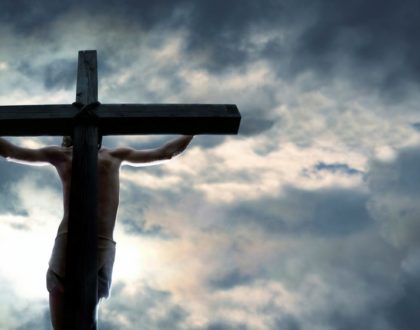
Good Friday
March 29, 2024
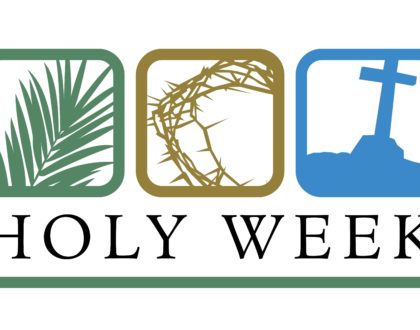
Maundy Thursday
March 28, 2024

